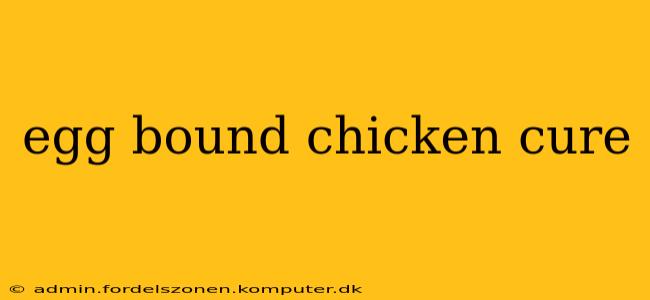An egg-bound chicken is a distressing sight for any poultry keeper. This condition, where a hen is unable to lay an egg, can be life-threatening if left untreated. Understanding the causes, recognizing the symptoms, and knowing how to effectively treat an egg-bound hen is crucial for maintaining a healthy flock. This comprehensive guide will walk you through everything you need to know about helping your egg-bound chicken.
What Causes a Chicken to Become Egg-Bound?
Several factors can contribute to a hen becoming egg-bound. Identifying the underlying cause is essential for successful treatment and preventing future occurrences.
- Age: Older hens are more prone to egg-binding due to weakening pelvic muscles and decreased calcium levels.
- Obesity: Overweight hens may have difficulty laying eggs due to restricted space in the pelvis. Maintaining a healthy weight is crucial for their overall well-being.
- Lack of Calcium: Calcium is vital for eggshell formation. A deficiency can lead to weak or deformed eggs that are difficult to pass. Ensure your hens have access to a balanced diet rich in calcium, such as oyster shell or crushed limestone.
- Dehydration: Dehydration can make the egg difficult to pass. Provide your chickens with ample access to fresh, clean water.
- Stress: Stress from environmental factors (e.g., overcrowding, predators, extreme temperatures) or illness can disrupt the laying process.
- Genetic Predisposition: Some breeds are more prone to egg-binding than others.
- Internal Injuries: Injuries to the reproductive tract can obstruct egg passage.
- Infections: Infections can inflame the reproductive tract and make laying difficult.
What are the Symptoms of an Egg-Bound Chicken?
Recognizing the symptoms early is crucial for a successful outcome. Signs of an egg-bound hen may include:
- Straining: The hen will frequently strain to lay, exhibiting restlessness and discomfort.
- Swollen Vent: The vent (cloaca) may appear swollen and inflamed.
- Loss of Appetite: The hen may lose her appetite and become lethargic.
- Depression: She may appear withdrawn and listless.
- Pale Comb and Wattles: These signs indicate dehydration and potential shock.
How Do I Help My Egg-Bound Chicken?
Treating an egg-bound hen requires a multifaceted approach, combining supportive care with potentially necessary interventions. Always consult with a veterinarian experienced in avian medicine for diagnosis and treatment. While the following suggestions can be helpful, they are not a substitute for professional veterinary care.
Home Remedies (Consult your vet before attempting):
- Warm Bath: A warm bath (not hot) can help relax the muscles and lubricate the egg. Ensure the water is shallow and supportive.
- Gentle Massage: Gently massage the abdomen around the egg, working towards the vent. Use extreme caution to avoid causing internal injuries.
- Lubrication: Applying a small amount of mineral oil or petroleum jelly to the vent can aid in egg passage.
Veterinary Intervention:
- Manual Removal: In cases where the egg is not easily passed, a veterinarian may need to manually remove the egg.
- Medication: Medications may be necessary to manage pain, inflammation, or infection.
- Surgery: In severe cases, surgery may be required.
How Can I Prevent Egg-Binding in My Chickens?
Prevention is key to avoiding this painful and potentially fatal condition. Implementing the following measures can significantly reduce the risk:
- Provide a Balanced Diet: Ensure your hens have access to a diet rich in calcium, protein, and essential nutrients.
- Maintain a Healthy Weight: Avoid overfeeding and encourage exercise.
- Minimize Stress: Provide a safe, comfortable, and stress-free environment.
- Regular Health Checks: Regularly inspect your hens for any signs of illness or discomfort.
- Fresh Water: Always provide access to clean, fresh water.
What if My Chicken is Still Straining After Treatment?
If your hen continues to strain after attempting home remedies, immediately seek veterinary assistance. Delaying treatment can lead to serious complications, including prolapse, rupture, and death.
Can an Egg-Bound Chicken Recover?
With prompt and appropriate treatment, many egg-bound hens make a full recovery. However, the prognosis depends on several factors, including the severity of the condition, the underlying cause, and the timeliness of intervention. Regular monitoring and veterinary care are crucial for ensuring a successful outcome. Early detection and intervention significantly improve the chances of recovery.
